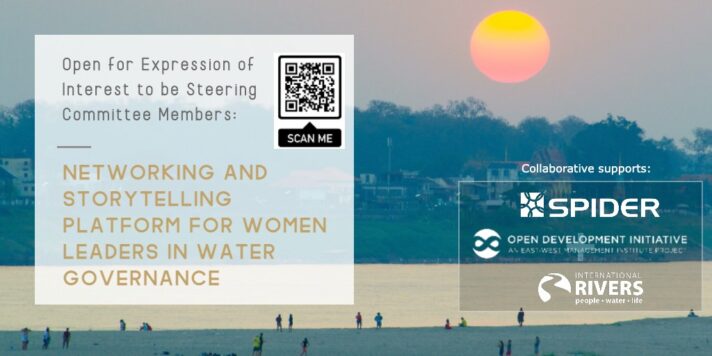Women in Water Governance Platform
Co-creating safe-space to amplify and legitimize women’s knowledge and voices in water and river governance
The Women in Water Governance (WIWG) Platform Project, led by the Open Development Initiative (ODI), is undertaking co-creation to develop a social innovation solution to support women to share knowledge, connect with one another, learn, and amplify their voices and legitimize their knowledge related to water and river governance. In February 2023, the 12-person all-female steering committee convened to begin the process of creating this safe space, with security safeguards, a robust governance structure, and initial wireframe ideas for the online space, backed up by technology infrastructure that establishes a baseline of no electricity, no hardware and connectivity, no literacy or digital literacy, with a minimum of start-up funds to build the necessary infrastructure. The project’s initial pilot region is the Lower Mekong Basin countries and Myanmar, but engages a gender-balanced Advisory Board that brings global perspectives and transdisciplinary expertise.
Background
At the Women and Rivers Summits in 2019 and 202, women leaders in water governance—including community leaders, activists, and members of civil society—have expressed an interest in a safe, inclusive digital space to support collaborative work across cultures and languages. Because networking and discussion spaces (both on- and offline) are typically male-dominated, women face barriers to participating, including cultural practices that minimize women’s participation. A pilot scoping study (2020) identified additional barriers including cultural biases leading to women having less time for and access to digital tools such as smartphones, computers and affordable data. They are also less likely to have the skills to use digital tools.
Research conducted by International Rivers (IR) aims to address the lack of women’s leadership in the water governance sectors. Two main needs emerged from the consultations with the Women in Water Congress: firstly, the need for more targeted leadership programming for women; and secondly, a dedicated platform for women leaders to engage in knowledge sharing and storytelling. IR along with other partners will commence an intensive programme called the Women and Rivers Accelerator to support the first need. Due to the ODI’s focus on the intersection of digital development, environmental governance, and advocacy, ODI is in the best position to address the second identified need and will partner with IR, Oxfam, and other academic and national partners to address it under this initiative.

Read More:
Special Thanks for the Contribution from:
Open Development Initiative (ODI): ODI is an open data and information network developed by EWMI that sheds light on development trends in the Lower Mekong Basin. ODI’s objective is to increase public awareness, enable individual analysis, improve information sharing, and inform rigorous debate—all contributing to the sustainable development of the region from a social, economic, and environmental perspective. By combining open data, data journalism, and research capacities and approaches, the initiative offers one-stop shopping for data on country or regional development for civil society, the private and public sector.
International Rivers (IR): IR is a global organization founded in 1985 with headquarters in Oakland, California, and regional offices in Asia, Africa, and Latin America. Their mission is to protect rivers and defend the rights of communities that depend on them. They work with river-dependent and dam-affected communities to ensure their voices are heard and their rights are respected; help to build well-resourced, active networks of civil society groups; undertake independent, investigative research; and engage with all relevant stakeholders to develop a vision that protects rivers and the communities that depend upon them.
Oxfam: Formed in 1995, Oxfam is a global movement of people fighting inequality to end poverty and injustice. Across regions, from the local to the global, they work with people to bring change that lasts. Oxfam’s work is grounded in the commitment to the universality of human rights.
SPIDER: This project is financed in part by the Swedish Program for ICT in Developing Regions (SPIDER). SPIDER is an independent centre focusing on the digitalisation of international development, bringing together actors in development to promote human centered technology for the achievement of Sustainable Development Goals (SDGs). The opinions conveyed are not necessarily shared by SPIDER.

